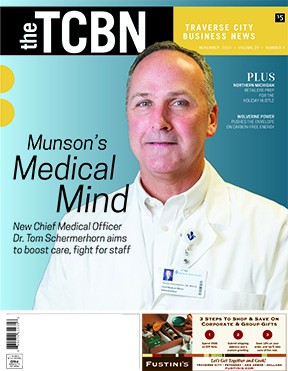'It Takes a Village': Mobile ATS unit provides critical care to rural communities
May 2024
One of the region’s most important beacons of hope for those struggling with drug and alcohol addiction is hitting the road.
Over the course of more than 40 years, Addiction Treatment Services (ATS) in Traverse City has helped thousands of people get help on their road to recovery. Though the roughly 90-person outfit is perhaps best known for its residential recovery home on Eighth Street, it offers multiple programs across several properties in the Traverse City area.
ATS has always served people from surrounding counties, but had barriers to providing assistance to that population. The largest by far is many people in the throes of addiction do not have adequate transportation, meaning getting to Traverse City for care can be daunting.
“There’s already a stigma associated with needing to get help for a substance use disorder,” said Paula Lipinski, CEO of ATS. “When you throw in having to drive 20 or 40 minutes, it just makes it that much more difficult.”
That’s why ATS recently rolled out a mobile unit that brings care to those in need. By meeting people in their communities, ATS leaders hope to make inroads into so-called “treatment deserts” in which inadequate access to care leads to much worse outcomes for those battling addiction.
“It’s so important to get out to these rural communities to give people a chance, give them an opportunity to fight their disease,” Lipinski said. “These services will ensure help is available when needed most without barriers of wait times or pre-treatment requirements.”
The mobile unit, housed in a converted bus, has regularly scheduled (usually once per week) four-hour stops in Mancelona, Kalkaska, Cadillac, Benzonia and Manistee. And while it has medication and other forms of direct medical assistance, perhaps its largest benefit is the chance to forge relationships with people so they can start – and continue – the recovery process.
“People who are struggling with substance use disorder are not always knocking on our door to get help,” Lipinski said. “But we speak the language, we understand it, we fight stigma, we’re warm and welcoming."
The program began in part because leaders at ATS heard a chorus of police officers, hospital and emergency room personnel, social workers and more asking them to get their services out on the road and into rural communities, Lipinski says.
“There are a lot of us here who came to work at ATS after working in those communities, and we still have connections to people out there who told us they need help,” she said. “We’re very much an agency that wants to be proactive, and we felt a responsibility, knowing that there’s no resources out there, to be as proactive as we can.”
Since launching less than a year ago, the results have been substantial. In Manistee County, Dawn Stefanski is a substance abuse counselor with the Manistee offices of Catholic Human Services. The 31-year veteran of substance abuse services in that county says the area is severely underserved, and that ATS has now become one of the primary providers of care there.
“This has been a true blessing for members of our rural towns,” she said. “Without a team approach in a community such as ours, treatment services would cease to exist and overdose deaths continue to rise.”
Stefanski says she is is thrilled that ATS is now at the front lines in her community and hopes they maintain a presence there well into the future.
“ATS has filled a very needed and necessary role in our community, and in this process has likely saved many lives,” she said. “The old saying of it takes a village to raise a child kind of fits; it takes a team to raise a healthy community, and ATS is part of that in the Manistee and Benzie areas.”
Jeremy Cannon is chief nursing officer at Kalkaska Memorial Health Center. Like Stefanski, he says the ATS mobile unit has provided a crucial layer of care for his community. This is particularly true for people who have been hospitalized but still require continuing, non-emergency care, he said.
“People in rural communities deserve access to high-quality health care, and the ATS mobile unit really allows that access point,” he said. “A lot of times when individuals are seeking treatment the first step is going to an emergency department…but that requires significant follow up. This mobile unit is a place where people can rely on follow-up access.”
Cannon is thankful that ATS is being proactive and allowing important care to flow to areas that need it.
"Recovery is a journey, and it takes a lot of people," he said. "As a hospital that cares about the community, we're really glad that we have other partners such as ATS helping to support some of these care delivery models."














